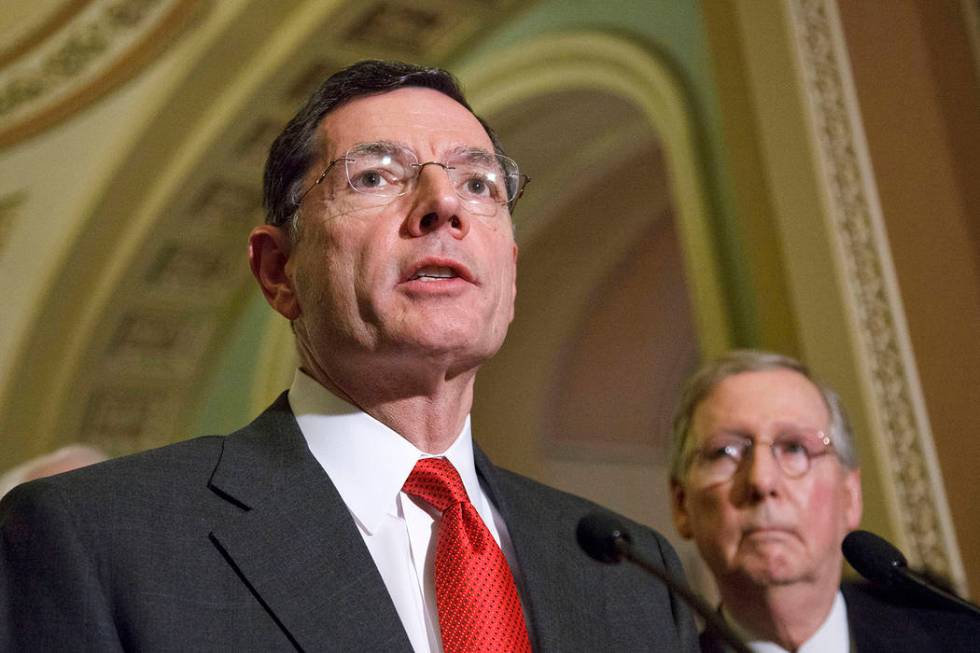Wyoming Sen. Barrasso says it’s time for Yucca Mountain

WASHINGTON — Sen. John Barrasso said Wednesday that “it’s time to end the political games” and complete the licensing on the Department of Energy’s application to build a permanent nuclear waste repository at Yucca Mountain in Nevada.
Barrasso, R-Wyo., the chairman of the Senate Committee on Environment and Public Works, has filed a bill to complete the licensing process that was shelved under the Obama administration and a Senate that was then controlled by Democrats and then-Majority Leader Harry Reid, D-Nev.
The comments come one week after the House Appropriations Committee blocked funding for the application process on Yucca Mountain — a victory for those who oppose burying nuclear waste in the desert 90 miles northwest of Las Vegas.
Barrasso’s push also comes after Sen. Lamar Alexander, R-Tenn. has called for a vote on the fate of Yucca Mountain before writing spending legislation. (Alexander favors a more diverse approach on nuclear waste storage, including interim storage to immediately take control of the stockpile of radioactive material.)
Alexander, the chairman of the Senate Appropriations subcommittee on energy and water, said he wants the Senate to decide whether to include Yucca Mountain in its plans for nuclear waste storage before he writes a spending bill with ranking Democratic Sen. Dianne Feinstein of California.
In an op-ed published in The Wall Street Journal, Barrasso said nuclear waste sits at 121 sites in 39 states. Most of the waste was produced by private power plants, although some was waste from nuclear-powered Navy submarines and ships.
The failure of the government to follow the 1987 law that designated Yucca Mountain the nation’s site for permanent waste storage “has become a roadblock for nuclear power in America,” Barrasso said. He blamed the delay on politics waged by the Obama administration and Reid, although he did not mention the former Nevada senator by name.
“This shouldn’t be a partisan issue,” Barrasso said. “Nuclear power is vital to the nation’s power supply and addressing climate change.”
Nevada Republican and Democratic federal and state officeholders have opposed development of Yucca Mountain, as have tribal leaders, business groups and environmentalists.
Officials in the state say Nevada was victim of politics — with a small, relatively new congressional delegation — when Congress voted in 1987 to place all of the nation’s nuclear waste at Yucca Mountain. Nevada does not receive electricity produced by nuclear power plants.
Gov. Steve Sisolak, a Democrat, is leading the state’s effort against the congressional effort to revive the licensing process. He is backed by every member of the state’s congressional delegation.
Rep. Dina Titus, D-Nev., and Sen. Catherine Cortez Masto, D-Nev., have filed legislation that would require consent from states, local governments and Native American tribes before the federal government could build a nuclear waste site.
Cortez Masto and Sen. Jacky Rosen, D-Nev., called Barrasso’s legislation when introduced a “half-hatched proposal to trample on Nevada’s rights.”
But officials in Nye County, where the site is located, support Barrasso’s legislation, and the possibility that development of the site would bring jobs, economic opportunities and increased tax revenues for schools and local governments.
“We want decisions to be made on Yucca Mountain to be based on facts and science and not empty rhetoric and fear mongering,” Leo Blundo, a Nye County commissioner, wrote to Barrasso last month.
Other rural Nevada counties also support the licensing process to determine if Yucca Mountain is safe for nuclear waste storage. The state, meanwhile, has filed 218 challenges to the application, mostly due to concerns about contamination and exposure to radiation.
Contact Gary Martin at gmartin@reviewjournal.com or 202-662-7390. Follow @garymartindc on Twitter.